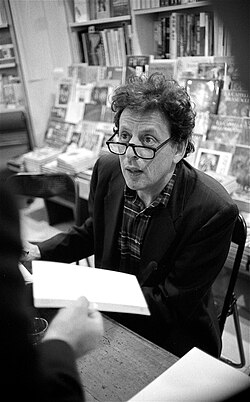| The Making of the Representative for Planet 8 | |
|---|---|
| Opera by Philip Glass | |
 Glass in 2006 | |
| Librettist | Doris Lessing |
| Based on | Lessing's novel of the same name |
| Premiere | |
The Making of the Representative for Planet 8 is a full-scale opera by Philip Glass with a libretto by Doris Lessing based on her novel of the same name, first performed in 1988. Together with Glass's 1997 opera The Marriages Between Zones Three, Four and Five , it is part of a planned trilogy of operas based on Lessing's Canopus in Argos novels. [1]
Contents
The opera was co-commissioned by English National Opera, Houston Grand Opera, Het Muziektheater, Amsterdam, and Theater Kiel, and co-produced with Artpark, Lewiston, New York State.